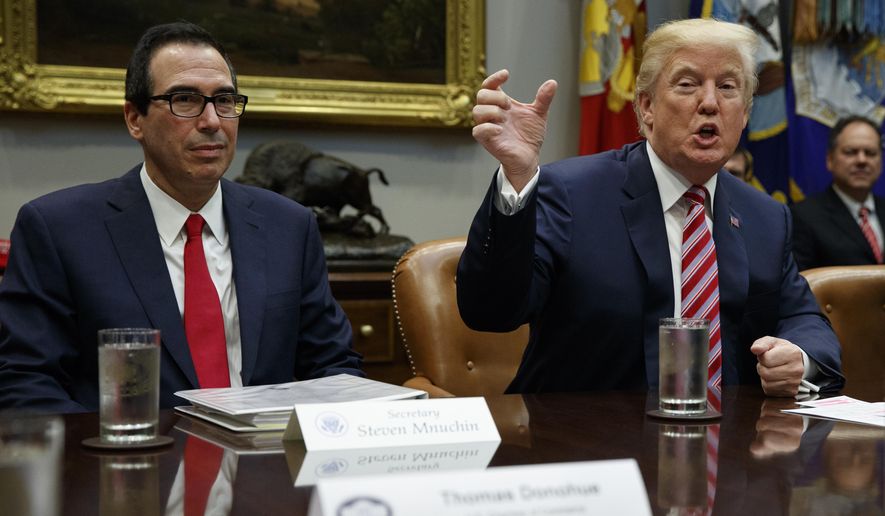Treasury Secretary Steven Mnuchin on Thursday said he will “follow the law” if House Democrats follow through and formally request any of President Trump’s personal or business tax returns.
Mr. Mnuchin was on Capitol Hill on Thursday to testify on the president’s 2020 budget request, but ended up answering questions from lawmakers on topics ranging from Mr. Trump’s returns to the 2017 Republican tax-cut law to the debt ceiling.
The secretary said he would consult with Treasury Department lawyers on any request for returns but ultimately follow the law, which allows the chairmen of Congress’s tax-writing committees to request individual taxpayer information for review.
“I’m not aware there’s ever been a request for an elected official’s tax return, but we will follow the law and we will protect the president as we would protect any individual taxpayer under their rights,” Mr. Mnuchin told the House Ways and Means Committee.
The secretary said the president has not asked him to intervene in or ignore the anticipated request. Mr. Mnuchin also said he has not discussed the topic with Mr. Trump’s attorneys or anyone at the White House.
House Democrats are in the midst of prepping a legal case to request Mr. Trump’s tax returns, saying lawmakers should be privy to whether any of the president’s vast investments open him up to conflicts of interest or whether he stands to benefit from laws he’s championing.
“Mr. Trump claimed … he would not personally benefit from the tax cuts in the tax bill of December of 2017. How can we know without seeing his tax returns?” said Rep. Bill Pascrell, New Jersey Democrat.
Mr. Pascrell and other Democrats had been pushing for two years on the issue while they were in the minority. But they were rebuffed by Republicans, who said they smelled a fishing expedition.
An obscure law says the treasury secretary “shall furnish” taxpayer information for review if either of the chairmen of Congress’s tax-writing committees request it.
Ways and Means Committee Chairman Richard Neal, Massachusetts Democrat, has been trying to take a methodical approach amid pressure from liberal interest groups to move more quickly.
There is also an ongoing legal debate over the issue, which could well end up in the courts depending on how Mr. Mnuchin responds to the expected request.
Mr. Trump, citing an ongoing audit, broke with decades of precedent and declined to release any tax returns during the 2016 campaign. He later said the American people don’t care about his tax returns, noting that he won the election.
Senate Finance Committee Chairman Charles E. Grassley has said he would like his panel to have the returns as well if Mr. Neal requests them, and that he doesn’t want House Democrats to use them for political purposes.
Rep. Kevin Brady on Thursday pointed out that states and other federal agencies do frequently request tax information for compliance or research purposes.
“Zero of those requests are for purely partisan reasons that weaponize the tax code,” said Mr. Brady, Texas Republican.
Mr. Mnuchin on Thursday also defended the $1.5 trillion tax-cut law congressional Republicans passed in late 2017.
He said economic growth and additional tax revenue from the economic growth that the law will generate will ultimately make up for the initial revenue hit the federal government took after Congress slashed rates across the board.
“This is simple math. If we do get the growth we expect, [the cuts] will pay for themselves,” he said.
Mr. Trump’s 2020 budget plan anticipates the economy will, on average, grow by about 3 percent per year for the next decade — well above the projection of approximately 2 percent from many independent forecasters.
“An extra one percent of GDP growth per year means trillions of dollars of additional economic activity and more revenue to the government,” Mr. Mnuchin said.
Democrats questioned the secretary’s claims, pointing to the administration’s own projections in the 2020 budget plan officials rolled out this week.
“The president’s own budget projects that the debt will hit $22.8 trillion in six years — that’s more than 50 percent higher than when the president took office,” said Rep. Brian Higgins, New York Democrat. “So these tax cuts do not pay for themselves.”
The Tax Policy Center also released an analysis this week that found the government brought in $275 billion less in fiscal 2018 than the Congressional Budget Office had been projecting before the law took effect.
Mr. Mnuchin also said refunds are now flat compared to the same time last year, but that he would consider providing additional relief to taxpayers who might have gotten unexpected bills during the current filing season under the new law.
He also urged Congress to act swiftly to increase the U.S. debt ceiling, and said lawmakers should simply raise the nation’s borrowing limit whenever they approve new spending.
• David Sherfinski can be reached at dsherfinski@washingtontimes.com.




Please read our comment policy before commenting.